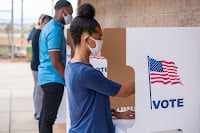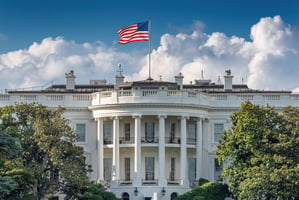NEJM Special Report Examines Future of U.S. Health Policy Following 2020 Election

What might the results of the 2020 presidential election mean for the future of health policy in the United States? Robert J. Blendon, Sc.D., and John M. Benson, M.A., of the Harvard T.H. Chan School of Public Health examine this question in a special report in the New England Journal of Medicine.
Blendon is the Richard L. Menschel Professor of Public Health and Professor of Health Policy and Political Analysis, Emeritus. Benson is a senior research scientist and is managing director of the Harvard Opinion Research Program.
“Our analysis … is drawn from the results of 19 national public opinion polls [with sample sizes ranging from about 500 to over 5,000 people], some as recent as October 2020,” they wrote.
The authors noted that these polls have revealed health care to be an issue weighing heavily on voters’ minds. In particular, one poll found that high health care costs in general and high drug costs were the top issues among voters who said that health care was extremely important to their presidential vote. This included 60% of those who said they were likely to vote for Trump and 54% of those likely to vote for Biden.
“When asked their opinion of several potential policy options for health insurance reform, majorities of Americans favor more than one approach,” Blendon and Benson noted. The authors offered several scenarios for health insurance reform should Democrats or Republicans control the Senate, Congress, and the presidency: “If Democrats are in the majority in the House and Senate and win the presidency, they will move on some sort of plan to achieve universal health care coverage,” likely building on the Affordable Care Act (ACA). “Republicans would be likely to put forward plans that would give states more authority to manage the operation of the existing ACA and Medicaid. They also would encourage the sale and availability of plans that would have much more limited benefits but be far less expensive to purchase. If the presidency and the Congress are divided by party, there is likely to be no major health care legislation enacted in the next term.”
They continued, “[I]n the next few years, state and local governments will have substantial financial shortfalls due to the economic downturn, which has worsened the state revenue forecasts.” Blendon and Benson described the impact that the presence or absence of federal subsidies to state or local governments might have on Medicaid, state public health, and mental health department spending.
They also examined where voters likely stand on the role of the government regarding slowing the spread of COVID-19, abortion rights, and racial disparities in health care and health overall.
“The polling suggests that regardless of the desire for bipartisan health policies addressing the major issues, the cores of the two parties are very far apart on these issues and are growing even farther apart as time goes on. Thus, it is important to recognize that the health policy directions of the next president and Congress may not be the same as those of the following presidents and Congresses,” Blendon and Benson wrote. “Looking at health care, for instance, we are likely to see an instability in U.S. health policy as decision-making shifts from one political party to another.”
For related information, see the Psychiatric News Alert “Americans Report Increasing Rates of Anxiety, APA Poll Finds.”





